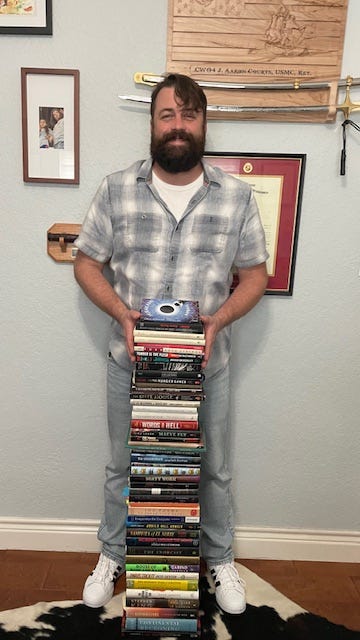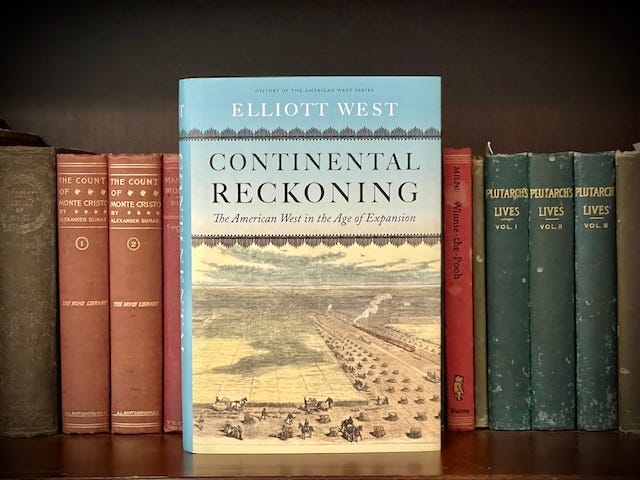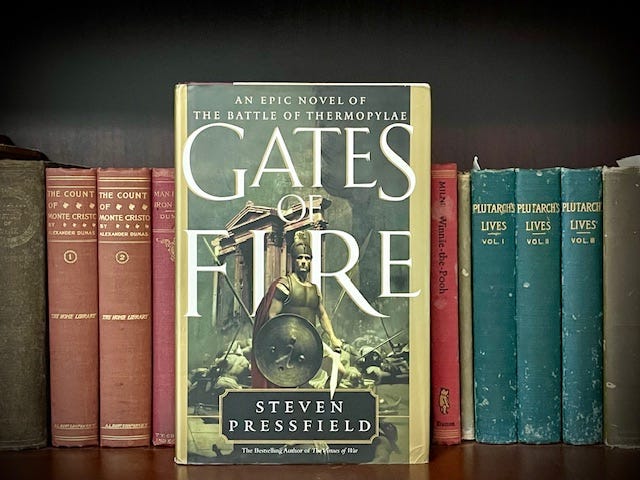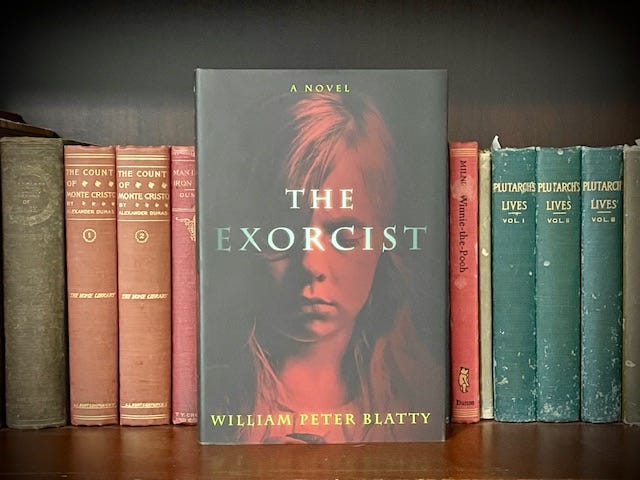This Year in Reading
A recap of what I read in 2024 and a few books you'll be glad you read in 2025.
2024 was a great year for reading, full of fiction and nonfiction, poetry and instruction, historical accounts and the fantastic—a truly healthy swath of literature—still, I missed my goal by about two and a half feet (I’ll get to that in a second). Then, last week sometime, I read a post making a case against setting tangible writing goals. You know the sort: read 52 books this year, read every book by an author this year, read your height in books this year. The list goes on and on.
The gist of the argument was something like it’s the journey that counts; that measurable goals get in the way of the reading experience and what one can take away from it; that human nature will lean towards achievement rather than growth.
I think anything that gets folks reading does more good than bad. And let’s be honest, our TBRs aren’t getting shorter, and time isn’t getting longer, but there’s no doubt the argument holds water. So, I’m not going to make a case one way or the other. Instead, I’ll just talk a little about my goal, how it turned out, and the titles I read.
Oh yeah, and some of those I think you should read in 2025.
I’d been reading at my regular pace for most of the year. That is to say, I read books in spurts. Two or sometimes three at a time for a month, then maybe nothing for a month or more. Then something happened in July. I began the Master of Fine Arts program at Vermont College of Fine Arts and discovered new literary gears and interests unknown to me before then.
I read four works in August and then something like a dozen in September, and I began to think it might be possible to read my height in books by year’s end. I was wrong. While I didn’t short cut any reads (at least not knowingly), there was always this little voice whispering, “start slouching in your chair or we’re gonna need to pick up the pace.” Not good for reading.
I’m happy to report, I’m still 71” and read at the same speed—maybe even a little slower— but the urge was there, pretty much supporting the argument discussed earlier. We’ll see what 2025 holds on this end, but I plan on following the post’s advice and am going to resist the compulsion to set any reading resolutions outside of a few intangibles: personal and professional growth through literature, continued improvement of my writing by reading like a writer, and most importantly, having fun!
And that is what I hope for you as well, growth through literature and fun! To that end, I’ve gone into some detail on a few of my favorites and put together a list of all the titles I read. The complete list is provided in an editorial note at the bottom of this essay, so feel free to pick my brain regarding specific questions you may have about any of them, especially if you’re interested in reading one, whether on my rec-list or otherwise.
I’ll not be racking and stacking them, identifying my leasts, nor offering my DNFs. With a selection this varied, it was inevitable that I wouldn’t “enjoy” some of them. With that said, I’ll be honest and forthcoming with any responses to specific questions about the titles listed. I got something from each of the titles listed and many, many of the reads on my complete list are ones I’d recommend, so I’m happy to chat about them.
A final note before you jump into my list. I think the genre assignments here are loose—very loose. In general, I think genre categories are as solid as MLB homeruns records, pro cycling wins, or women’s gymnastics medals during the Beijing Olympics: asterisks required. A good story—the best stories—draw from all sorts of literary tools and cannot be accurately branded by this genre or that, certainly not any single genre. The following are great stories! I’m offering some wavetop genres for organizational purposes only. Really, as a means to keep from listing way too many works for an essay, and so you can plan your reading schedule and include some variety. That’s all.
So here we go. My 2024 reads, a few (by genre-ish) I think might surprise you, and the ones I believe should be on your to-be-read list in 2025 no matter what.
1. Horror
Jaws by Peter Benchley
Jaws is arguably the most recognizable, widely known story on the planet—maybe one or two of Jupiter’s moons as well. The film adaptation is so effective people are still (after so many years) scared to swim in their pools. Credit can be given to Spielberg, naturally, and the writers of the screenplay Carl Gottlieb and Peter Benchley, but most of the credit belongs to the latter.
Benchley wrote the novel after all, and man is it good. Few works build tension, play on human emotion (and instinct), and create such an impressive narrative arch in so few pages. Whereas a case could be made that the shark in Jaws (film adaptation) is one of the best monsters, in one of best films ever made—maybe one of the only prefect films in history—there’s no argument against “the great fish” in Jaws (the novel) being one of the most compelling non-human characters in literature, especially without playing on anthropomorphization. It won’t surprise anyone, but I also believe characterization of the human characters is more provocative in the novel than in the film. So, this is not a question of which-one’s-better, but more a question of why-haven’t-you-watched-and-read-them-both.
Whether you love the film or have managed to dodge it, love horror or think you hate it, and especially if you believe you already know the story well enough to skip the novel, this is one you should read in 2025. I’ll be issuing bonus points for those who read it before summer and extra bonus points for anyone waiting long enough to read it at the beach and then still go swimming.
I like the 50th Anniversary Edition, published by Ballentine Books in 2024. There’s a ton of bonus material in this edition including an intimate forward by Benchley’s widow, Wendy; a reprinting of the forward to the 13th Anniversary Edition, in Benchley’s own words; a ridiculously long list of proposed titles (more than 125 which I find motivational since I struggle with titles—badly); letters from Benchley to one of the film adaptation’s producers (it’s pretty juicy); an excerpt from Benchley’s nonfiction account of writing the novel, selling the movie, and working with Spielberg; and more. The cover art is killer too—literally.
2. Poetry
Into English: Poems, Translations, Commentaries edited by Martha Collins & Kevin Prufer
Here’s a prime example of where works fit into several genres. Though I’m including a section on translation, and well, translation is in this this book’s title, the poems are special to me for a few reasons.
First, they’re good. That’s true, and probably what you care about anyway. The collection is broken down into various languages and the contributors offer commentary on the original and several respected translations, which are all very interesting. So, the reader is really getting 3 bonus poems for every 1. This collection introduced me to poems and poets I would have never read otherwise.
Second, I participated in a workshop at one of VCFA’s residencies which was in poetry translation and the relationships I made with other students of literature and poets has been rewarding, and I’m happy to say, lasting.
Finally, this collection was the catalyst for me to write new, different poetry than I ever would have thought existed inside of me. Several of them are making their submission rounds now and one garnered me a personal rejection letter and invitation to submit more of my poetry in the future. A huge win in my book!
Whether you appreciate the commentary on poetics, the poets’ stories, the analyses of poetry and translation, or just want to snap your fingers at good poetry alone in front of the fireplace, I think this collection will satisfy your desires and exceed all expectations.
3. Non-Fiction
Continental Reckoning: The American West in the Age of Expansion by Elliott West
This is a book! A real book. A book to break loose a rusted lug nut, or beat a robber to death, or use as the cornerstone for your next home. And it’s a book that should be in every home, public, private, and academic library in the world. It’s informative, enlightening, and dare I say, re-educational. And it’s tragic, inspirational, and funny. It’s also written by a legit authority who happens to be one hell of a storyteller. And it’s America’s story—Our story—much of which I’d wager you don’t actually know. I love history but learned more from the introduction, prelude, and acknowledgments than I did in grade school (save 7th grade Texas History) and that’s not a knock against any of my history teachers.
I’ve written a little about it before, which you can read here, but I’ll reiterate: this is a wonderful read. I was so into it, that when some travel came up, I downloaded the audio book to keep it going. You’ll want the text for sure. It’s chalked full of maps, images, and other records of all sorts, so it really is a resource (think The Landmark Thucydides for American history in the West), but if large non-fiction works aren’t your jam, I think the audio book is a great option. It’s narrated wonderfully and I’d put a paycheck on you rushing to order the actual text before the end of the first section.
If you think you know American history, as I did—world history even—get this book and be amazed!
4. Fiction
The Orphan Master’s Son by Adam Johnson
It’s hard to describe how great this novel is. It’s won several notable literary awards including the 2013 Pulitzer Prize for Fiction. It’s the most compelling thing I’ve read in some time. It’s also the work I’ve dreamed the most about since reading it.
It tells of a North Korean man’s journey in, through, and against the forces which govern an isolated dictatorship and shape its people’s existence. You will gasp. You will laugh. You will probably cry. And you will love it!
I read a collection of short stories by Johnson before this novel, and I’m convinced there’s no author writing today (at least none that I’ve read) who can compel a reader’s empathy for his characters quite like Johnson can. If you can only read one novel in 2025, make it The Orphan Master’s Son.
On a side note, the audio book includes a brief note from the author where he discusses his trips to North Korea and some of the artistic decisions he made while writing the novel. It’s worth a listen. The audio version might also be useful for those readers who struggle with unfamiliar names.
5. Historical Fiction
Gates of Fire by Steven Pressfield
I’ve written about this novel in one way or another so many times. Simply put, I love this novel. My Marines even included a few lines from the story on my retirement plaque that I would quote to them. It is, in my not-so-humble opinion, the best historical fiction ever written. I can’t even remember what the occasion was for me to read it again this year, but I never pass up the opportunity. And somehow, even on my 10th reading—probably more—I am still amazed.
Love it with me! Get the novel and then we can talk about it. Then I’ll give you a few recs for some other novels by Pressfield you’ll regret not having read sooner. You have my word.
6. Translation
Pinball, 1973 by Haruki Murakami
I was nearing the end of a two-week vacation in Japan and working on an essay when it bothered me that I’d been in Japan, a country with a culture steeped in art, literary and otherwise, and wasn’t reading or writing about any of it. I felt, as a writer, that I was insulting a place I love. So, I stopped in a bookshop and picked up two Japanese titles. One was a manga classic, and the other was Murakami’s, Pinball, 1973.
Boy, am I glad I came across this one. It blends points of view, timelines, and imbedded storytelling in a way that draws on universal human experiences, and in doing so, bridges cultural peculiarities. Murakami’s introduction gives insight into how he developed such a unique voice in contemporary literature and how this story came to be. Writers will love the VIP tour behind the curtain, but readers of any sort will appreciate the relatability of Murakami’s story. And it’s just over 160 pages, so it’s a fast read. Enjoy!
7. Most Evocative
The Exorcist by William Peter Blatty
If you’re anything like my wife, you’ll think the following opinion is crazy, maybe. Probably. If you’ve read Blatty’s masterpiece, maybe not. Definitely.
The Exorcist is one of the greatest love stories ever told.
There’s not more to say, but for those who haven’t read it, or think the film adaptation is the story, or for those who have been in contact with my wife, I’ll elaborate. Before I do, let me address what I think might be the most common reasons people avoid the novel: it’s too scary, I’ve already seen the movie, it’s sacrilegious.
I’ve written about this novel before too. You can read some of that here. I’m not shy about my love for it, and like Pressfield’s, I never pass up an opportunity to read it again. But to the potential concerns…
First, it’s scary, but not any scarier than other books you’ve read (subjective, I know, but I think accurate). What makes this different (maybe) is the supernatural element, ambiguity, and stakes. So, yeah, it’s scary sometimes, but it’s also hilarious, empathetic, and inspirational—especially inspirational.
Next, the movie. Okay, this one has some merit since Blatty also wrote the screenplay. A simple google search will offer some reasons as to how and why the film is a genuine horror flick and different than the novel. But take my word for it, despite the preeminence of The Exorcist (film adaptation) in the cannon of horror in film and cinematography in general, The Exorcist (novel) is something else altogether. Something much, much more than a horror story.
Finally, I’ve heard that the story is sacrilegious. Respectfully, that position is one born of ignorance. Again, a simple google search will bring a reader to several articles and interviews with Blatty where he explains why he wrote the novel and its message.
SPOILER ALERT!!! It’s a message of hope and faith, not evil’s victory of good and certainly not that of the devil’s over God.
Blatty was so concerned about the messaging and how the film might have skewed readers, that he revised the novel for later editions and included additional dialogue and another chapter in the 40th anniversary edition. Regardless of what version you read, I believe it’s a love story. And a story of hope. And a story of faith.
Here are a few honorable mentions without much context (sorry, but this is already longer than I planned): Fortune Smiles by Adam Johnson, The Things They Carried by Tim O’brien, The Barracks Thief by Tobias Wolff, Words from Hell by Jess Zafarris, and On Becoming a Novelist by John Gardner.
Now, fire any questions you might have my way, support your local bookstore, and have some fun with these titles. They are killer and you won’t regret it. Of that, I’m sure!
Semper Fidelis.
Editorial note:
Here’s the complete list of the books I read in 2024 (including those not pictured) for your review and questioning pleasure:
Nineteen Claws and a Black Bird by Agustina Bazterrica (Simon & Schuster, 2023)
Tender is the Flesh by Agustina Bazterrica (Scribner, 2017)
Jaws 50th Anniversary Edition by Peter Benchley (Ballentine Books, 2024)
The Exorcist 40th Anniversary Edition by William Peter Blatty (Harper Collins Publishers, 2011)
Dirty Work by Larry Brown (Algonquin Books, 1989)
Invisible Cities by Italo Calvino (Vintage Classics, 1997)
Vampires of El Norte by Isabel Cañas (Berkley, 2023)
Into English: Poems, Translations, Commentaries edited by Martha Collins & Kevin Prufer (Graywolf Press, 2017)
The Hunger Games by Suzanne Collins (Scholastic Inc., 2008)
Devils Kill Devils by Johnny Compton (Tor Nightfire, 2024)
The Spite House by Johnny Compton (Tor Nightfire, 2023)
Linguistics for Everyone: An Introduction, Second Ed. edited by Kristin Denham & Anne Lobeck (Cengage, 2010)
Paris Trout by Pete Dexter (Penguin Group USA, 1989)
William Shakespeare’s Star Wars by Ian Doescher (Quirk Books, 2013)
William Shakespeare’s The Empire Strikes Back by Ian Doescher (Quirk Books, 2014)
The Reformatory by Tanarive Due (Saga Press, 2023)
Gone Girl by Gillian Flynn (Broadway Books, 2012)
Rock Springs by Richard Ford (Vintage Contemporaries, 1988)
On Becoming A Novelist by John Gardner (HarperCollins, 1983)
The Ocean at the End of the Lane by Neil Gaiman (William Morrow, 2013)
100 Poems to Break Your Heart by Edward Hirsch (Ecco, 2023)
A Shropshire Lad by A.E. Housman (J.J. Little and Ives Company, 1932)
House of Bone and Rain by Gabino Iglesias (Mulholland Books, 2024)
Fortune Smiles by Adam Johnson (Random House, 2015)
The Orphan Master’s Son by Adam Johnson (Random House, 2012)
The Cabinet of Calm by Paul Anthony Jones (Elliot & Thompson Limited, 2020)
Why is this a Question? by Paul Anthony Jones (Elliot & Thompson Limited, 2022)
Milk and Honey by Rupi Kaur (Andrews McMeel Publishing, 2016)
You Like it Darker by Stephen King (Scribner, 2024)
Several Short Sentences About Writing by Verlyn Klinkenborg (Knopf, 2012)
Small Hours by Ilyse Kusnetz (Alice James Books, 2014)
Bobcat and Other Stories by Rebecca Lee (Algonquin Books of Chapel Hill, 2013)
Maeve Fly by C.J. Leede (Tor Nightfire, 2023)
When Good Trails Go Bad by Stephen W. Littlewood (2022)
A Giacometti Portrait by James Lord (Farrar Straus Giroux, 1980)
Incidents Around the House by Josh Malerman (Del Rey, 2024)
One Hundred Years of Solitude by Gabriel García Márquez (Harper Perennial Modern Classics, 2006)
The Road by Cormac McCarthy (Knopf, 2007)
Pinball, 1973 by Haruki Murakami (Kodansha International, 1980)
Richard Mathesson’s I Am Legend adapted by Steven Niles & Elman Brown (IDW Publishing, 1991)
The Things They Carried by Tim O’Brien (Houghton Mifflin/Seymour Lawrence, 1980)
How to Breathe Underwater by Julie Orringer (Knopf, 2003)
Gates of Fire by Steven Pressfield (Doubleday, 1998)
Modern Poetry by Diane Seuss (Graywolf Press, 2024)
Bomba! by Osuma Tezuka (Vertical Comics, 2022)
The Sleepwalkers by Scarlett Thomas (Simon & Schuster, 2024)
Little Soul and the Selves by Leslie Ullman (Three: A Toas Press, 2023)
Continental Reckoning: The American West in the Age of Expansion by Elliot West (University of Nebraska Press, 2023)
The Barracks Thief by Tobias Wolff (Ecco Press, 1984)
Words From Hell by Jess Zafarris (Chambers, 2023)












Gates of Fire is one of my all time favorites. I also enjoyed The Afghan Campaign.
Thanks for the lists of recommended reading. I've loaded up my library audiobooks and am ready to get starting listening-reading.